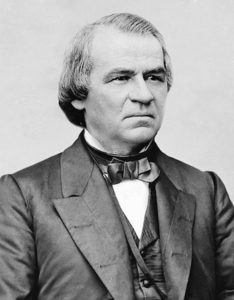
Andrew Johnson
*Andrew Johnson was born on this date in 1808. He was a white-American tailor and politician. Johnson was born in poverty in Raleigh, North Carolina, and never attended school. Jacob Johnson's father was a porter at an inn, among other jobs, and died when he was 3, while his mother, Mary “Polly” McDonough Johnson, was a laundress and seamstress.
Apprenticed as a tailor, he worked in several frontier towns before settling in Greeneville, Tennessee. He served as alderman and mayor there before being elected to the Tennessee House of Representatives in 1835. After brief service in the Tennessee Senate, Johnson was elected to the U.S. House of Representatives in 1843, serving five two-year terms. He became Governor of Tennessee for four years and was elected by the legislature to the U.S. Senate in 1857.
In his congressional service, he sought passage of the Homestead Bill, enacted soon after he left his Senate seat in 1862. As Southern slave states, including Tennessee, seceded to form the Confederate States of America, Johnson remained firmly with the Union. He was the only sitting senator from a Confederate state who did not resign his seat upon learning of his state's secession.
In 1862, President Lincoln appointed him as military governor of Tennessee after most of it had been retaken. As the 17th president of the United States, they served from 1865 to 1869. Johnson assumed the presidency as he was vice president of the United States at the time of the assassination of Abraham Lincoln. In 1864, as a War Democrat and Southern Unionist, Johnson was a logical choice as running mate for Lincoln, who wished to send a message of national unity in his reelection campaign; their ticket easily won. When Johnson was sworn in as vice president in March 1865, he gave a rambling speech, after which he secluded himself to avoid public ridicule. Six weeks later, the assassination of Lincoln made him president.
Johnson implemented his form of Presidential Reconstruction, a series of proclamations directing the seceded states to hold conventions and elections to reform their civil governments. He also shelved General William T. Sherman’s Special Field Order #15 of January 16, 1865, commonly known as Forty Acres and a Mule. When Southern states returned, many of their old leaders passed Black Codes to deprive the Blacks of many civil liberties. Congressional Republicans refused to seat legislators from those states and advanced legislation to overrule the Southern actions. Johnson vetoed their bills, and Congressional Republicans overrode him, setting a pattern for the remainder of his presidency. Johnson opposed the Fourteenth Amendment, which gave citizenship to former slaves.
In 1866, Johnson went on an unprecedented national tour promoting his executive policies, seeking to destroy his Republican opponents. He enlisted General William T. Sherman to go west on behalf of the United States to gain even more land and secure space for an ambitious westward expansion. Bison were a critical part of that plan; destroying the Bison meant destroying Native Americans. Sherman’s job was to use the U.S. Army to protect the transcontinental railroad and secure mining interests in territory traditionally owned and settled by Native Americans. Buffalo Bill Cody and George Armstrong Custer gained military reputations by killing Bison and Native Americans under Johnson's watch.
As the conflict between the branches of government grew, Congress passed the Tenure of Office Act, restricting Johnson's ability to fire Cabinet officials. When he tried to dismiss Secretary of War Edwin Stanton, he was impeached by the House of Representatives and narrowly avoided conviction in the Senate and removal from office. He oversaw 38 treaties with Native American nations, including the Medicine Lodge Treaty in 1867, which relocated Southern Plains tribes to reservations far away from white settlements. After failing to win the 1868 Democratic presidential nomination, Johnson left office in 1869.
Johnson's main positive accomplishment as president was the Alaska Purchase. Returning to Tennessee after his presidency, Johnson sought political vindication. He gained it in his eyes when he was elected to the Senate again in 1875, making Johnson the only former president to serve in the Senate. He died five months into his term on July 31, 1875. Johnson's strong opposition to federally guaranteed rights for African Americans is widely criticized. Many historians regard him as one of the worst presidents in American history.